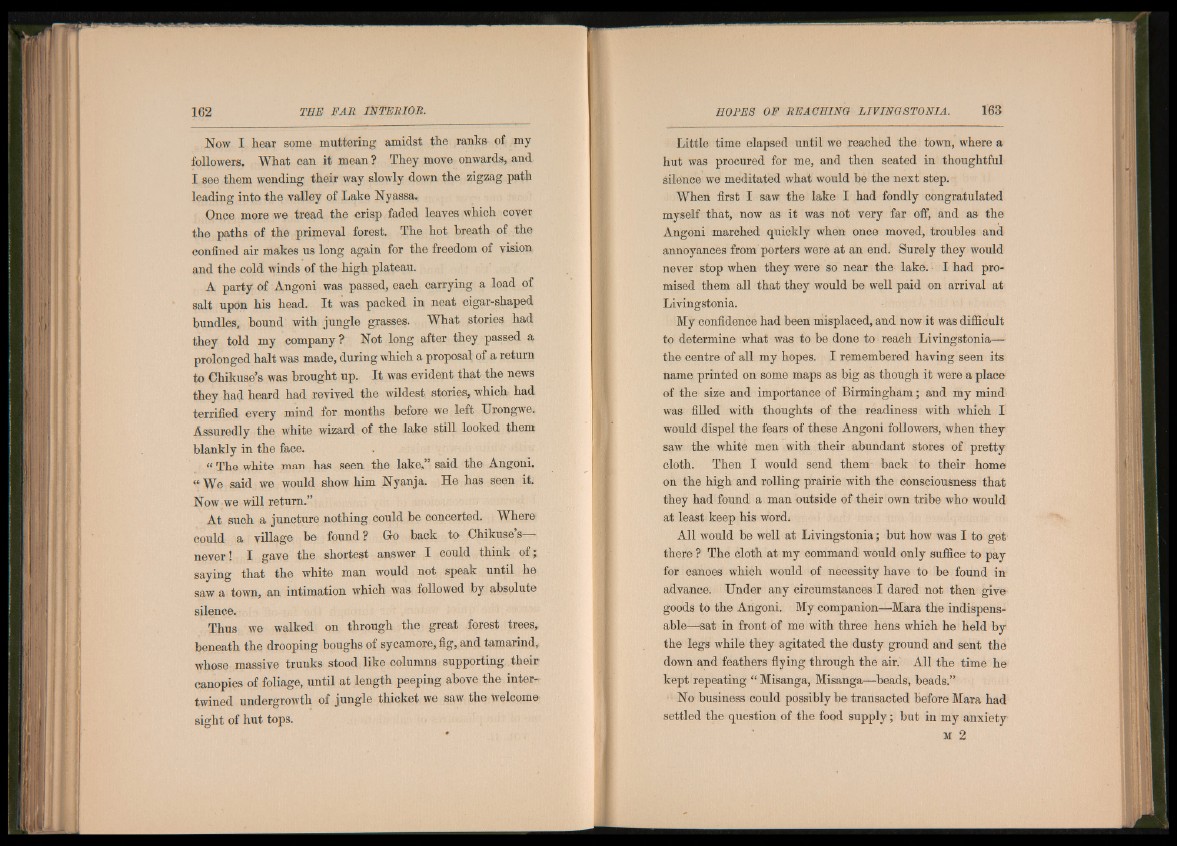
Now I hear some muttering amidst the ranks of my
followers. What can it mean ? They move onwards, and
I see them wending their way slowly down the zigzag path
leading into the valley of Lake Nyassa.
Once more we tread the crisp faded leaves which cover
the paths of the primeval forest. The hot breath of the
confined air makes us long again for the freedom of vision
and the cold winds of the high plateau.
A party of Angoni was passed, each carrying a load of
salt upon his head. I t was packed in neat cigar-shaped
bundles, hound with jungle grasses. What stories had
they told my company ? Not long after they passed a
prolonged halt was made, during which a proposal of a return
to Chikuse’s was brought up. I t was evident that the news
they had heard had revived the wildest stories, which had
terrified every mind for months before we left Urongwe,
Assuredly the white wizard of the lake still looked them
blankly in the face.
“ The white man has seen the lake,” said the Angoni.
“ We said we would show him Nyanja. He has seen it.
Now we will return.”
At such a juncture nothing could he concerted. Where
could a village he found? Go back to Chikuse’s—
never! I gave the shortest answer I could think o f,
saying that the white man would not speak until he
saw a town, an intimation which was followed by absolute
silence.
Thus we walked on through the great forest trees,
beneath the drooping boughs of sycamore, fig, and tamarind,
whose massive trunks stood like columns supporting their
canopies of foliage, until at length peeping above the intertwined
undergrowth of jungle thicket we saw the welcome
sight of hut tops.
Little time elapsed until we reached the town, where a
hut was procured for me, and then seated in thoughtful
silence we meditated what would be the next step.
When first I saw the lake I had fondly congratulated
myself that, now as it was not very far off, and as the
Angoni marched quickly when once moved, troubles and
annoyances from porters were at an end. Surely they would
never stop when they were so near the lake. I had promised
them all tha t they would be well paid on arrival at
Livingstonia.
My confidence had been misplaced, and now it was difficult
to determine what was to he done to reach Livingstonia—
the centre of all my hopes. I remembered having seen its
name printed on some maps as big as though it were a place
of the size and importance of Birmingham; and my mind
was filled with thoughts of the readiness with which I
would dispel the fears of these Angoni followers, when they
saw the white men with their abundant stores of pretty
cloth. Then I would send them back to their home
on the high and rolling prairie with the consciousness that
they had found a man outside of their own tribe who would
at least keep his word.
All would be well at Livingstonia; but how was I to get
there ? The cloth at my command would only suffice to pay
for canoes which would of necessity have to be found in
advance. Under any circumstances I dared not then give
goods to the Angoni. My companion—Mara the indispensable—
sat in front of me with three hens which he held by
the legs while they agitated the dusty ground and sent the
down and feathers flying through the air. All the time he
kept repeating “ Misanga, Misanga—beads, heads.”
No business could possibly be transacted before Mara had
settled the question of the food supply; but in my anxiety
M 2